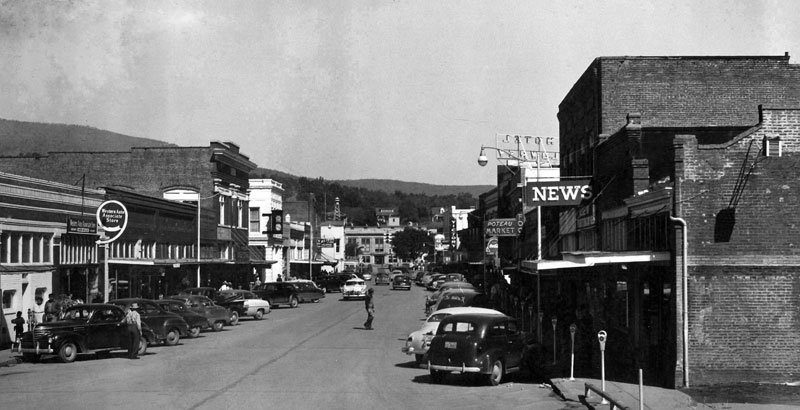
Poteau, situated in one of the most beautiful sections of Eastern Oklahoma and the county seat of LeFlore county, is a growing, bustling city with an eye upon the future and with a historical heritage few other communities can match. Various races of men have known the region throughout the centuries. Mound Builders, between 500 and 1,300 A.D., built their temples and burial places in what is now the Spiro area of northern LeFlore county and roamed southward into the mountainous regions of South LeFlore. Mayan Indians pressing up from what is now Mexico and Central and South America, clashed with the Mound Builders, hundreds of years ago.
The clashes between these pre-Columbian races of men were still going on, perhaps, when blond explorers from across the ocean—adventurous Vikings—trod the wilderness that one day would be Poteau and LeFlore county, climbed the mountains and hills of southern LeFlore, and gazed westward towards the plains country which perhaps to them seemed without end.
Then in 1719, the French explorer Bernard De Harpe, led an expedition to the Poteau area. The modern Poteau, however, had its origin in 1885, with a few houses and Bud Tate’s general store. Incorporation of the town of Poteau followed on October 8, 1898. This same year the first public building, a school was constructed of native stone—the building having been erected through contributions of the Poteau residents. the first Poteau post office was established in 1888.
The first few years of Poteau’s growth, after it was incorporated were rapid ones. In 1908, a year after the Indian Territory was admitted to statehood, the required population 2000 was attained, and Governor C.N. Haskell issued a proclamation declaring Poteau to be a city of the first class.
Federal court was moved to Poteau from Cameron in 1900, and in 1903 activities of the town largely centered on this court. At that time, Poteau was a sparsely populated but energetic little community. The Kansas City Southern and Frisco railroads were both running lines through town. The Bank of Poteau was established in 1901, and in 1904 it was nationalized. That same year, the First Bank of Poteau was organized, and deposits of each were estimated at about $50,000.
The Amos handle factory was one of the most thriving enterprises during the early part of the 1900’s while the Poteau News, first published in 1895, had a subscription list of about 350. The telephone company was granted a franchise in 1904, followed shortly by electric lights and water works system in 1906. One of the first natural gas wells was discovered in 1910.
In 1913 the Witteville coal mine was operating near Poteau and although that mine was abandoned, several others were opened and contributed large payrolls to the communities for many years. Poteau coal is of the best quality and was in demand by eastern and northern buyers. Coal mining was the primary industry of Poteau until production slackened in that field; Since then industrial development, lumbering, vegetable production, cattle raising, and broiler production have become important.
Poteau was a city loved by the late United States Senator Robert S. Kerr. He had built a magnificent home at Poteau, invested money in a great ranch and in cattle. He envisioned Poteau as a major city with the opening of navigation on the Arkansas River. He pointed out that the Poteau River, with its mouth on the Arkansas at historic Belle Point in Fort Smith, could be made navigable to the city of Poteau.
The name Poteau is French; the translation means, “Post”. According to historians the name was derived from a post or stake marking a trade area. Poteau is located on the banks of the river now bearing the name Poteau River. It is located in Eastern Oklahoma 192 miles east of Oklahoma City and 137 miles southeast of Tulsa, Ok.
The corporate limits of the city include 17,570 acres of 27.45 square miles. However, all but about five square miles is area that Poteau has incorporated along 33 miles of the Poteau River from Lake Wister to Spiro, Ok in order to protect the city for building of future ports on the Poteau River. Today, Poteau has an estimated population of 8,000 with an increasing industrial base. Within Poteau there are several light manufacturers including clothing manufacturing plant, an electronics manufacturing plant, a gas burner systems plant, and a carpet manufacturing plant among others. Current total employment in these industrial plants exceeds 500.
Poteau has a complete school system starting with nursery school and continuing through two years of junior college, plus a vo-tech school. Carl Albert Junior College is state accredited and is the fastest growing junior college in Oklahoma. A new elementary school has been completed within the past two years and additions are still being made. A new junior high school is under construction.
Poteau has the Mayor-Council form of government. The Council consists of eight members. The Mayor and eight councilmen are elected by popular vote for four-year terms. The Police Department includes the chief of police, who is elected by popular vote, and 12 other officers. The county sheriff’s office is located in Poteau. Poteau is the headquarters for six highway patrolmen and an inspector. The volunteer fire department includes a fire chief, assistant chief, captain, and 13 firemen.